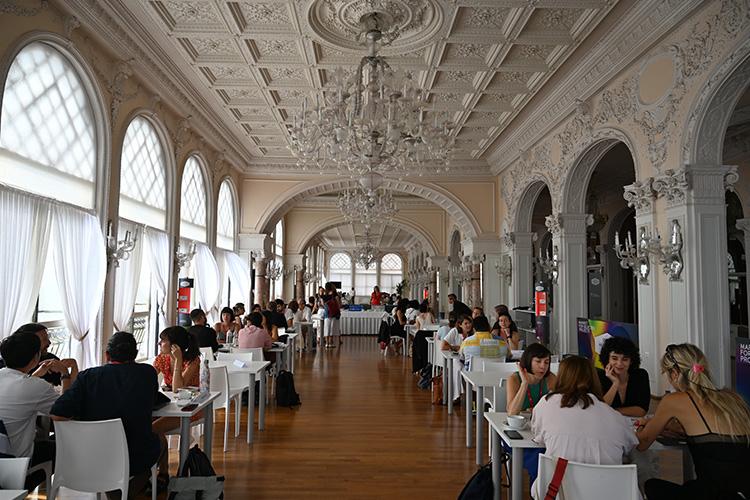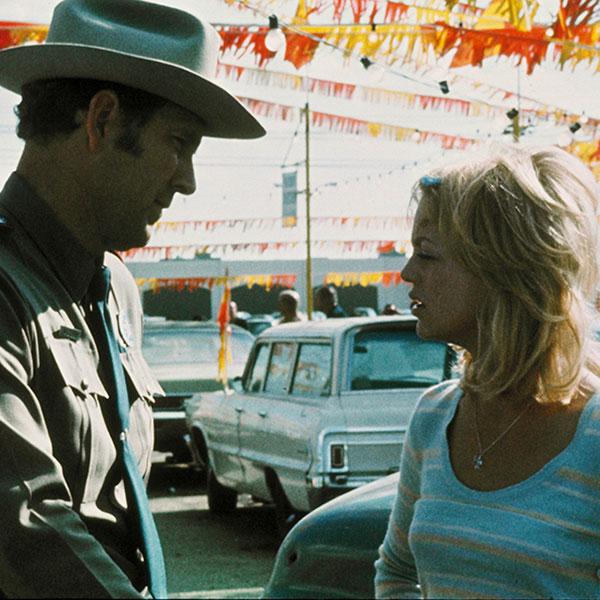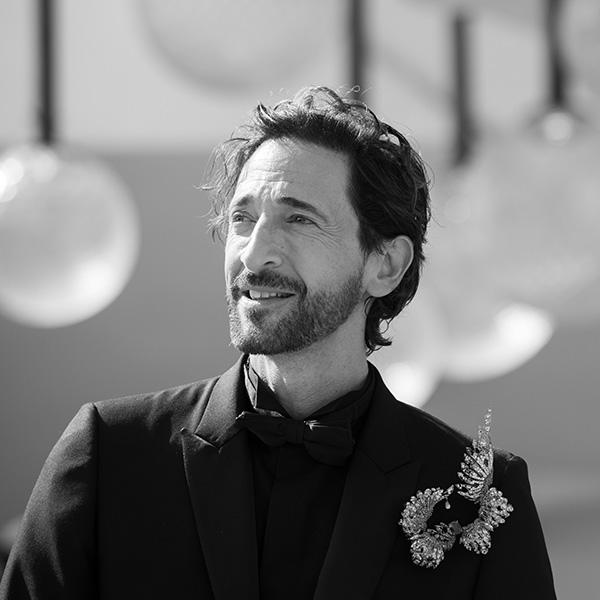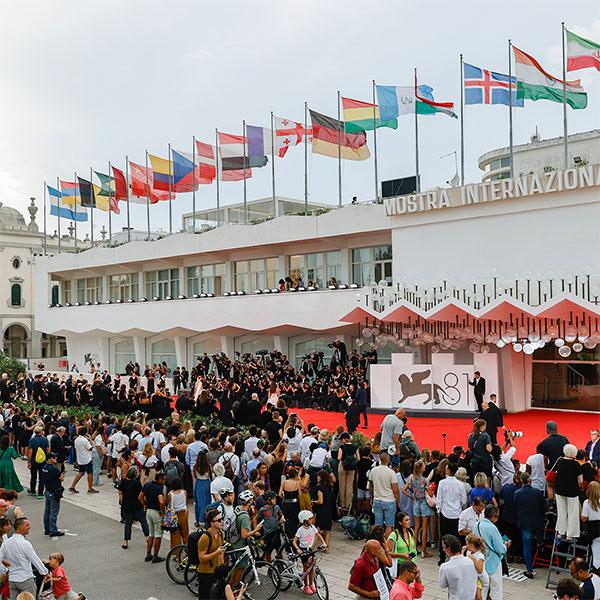“Beyond the Conventional: Eleven years of the Biennale College Cinema”

Biennale College Cinema: international panel to be held on 4 September
The discussion (c/o Hotel Excelsior, 4:30 pm) will be chaired by film historian Peter Cowie.
Moderator’s Introduction
Even a cursory study of the history of the Venice Biennale shows that among the most recurring elements in all the arts programmes are aesthetic originality, and technical experimentation. These qualities have set the Venice Mostra apart from other film festivals, and so it's appropriate that the Biennale College Cinema films reflect these values.
In the circumstances that the cinema finds itself today, with Hollywood virtually at a standstill, and negotiations in progress that will affect the lives and work of everyone in the industry, from stars to extras, the role of the Biennale College programme becomes more and more vital.
The format of the programme encourages filmmakers to experiment as they wish, while still respecting the essential values of the cinema – well-shaped characters, narrative fluency, and ensuring that the themes and issues of the film retain their cogency.
Although some of the most striking College films have come from the traditional leaders in filmmaking – Italy, the United States, France – others have stemmed from countries like Ecuador, Lesotho or Kazakhstan that are rarely prominent at film festivals. And, this time around, Mexican and Hungarian directors have successfully joined the line-up.
Speakers
Moderator: Peter Cowie
In 1963, Peter Cowie launched the annual International Film Guide, which appeared under his editorship for 40 years. He has written more than 30 books about film, including biographies of Welles, Kurosawa and Coppola. Among the publications he has written articles for are The New York Times, The San Francisco Chronicle, The Los Angeles Times, the London Sunday Times, The Wall Street Journal, Le Monde, Expressen, Neue Zürcher Zeitung, and Sight and Sound. He was International Publishing Director of Variety from 1993 to 2000. His biography of Ingmar Bergman, God and the Devil, will be published by Faber and Faber this year.
Sara Ehnholm Hielm
Sara Ehnholm Hielm is a film critic at Hufvudstadsbladet in Helsinki, Finland. She is also a publisher and an author and her latest book Hur jag gick på bio och aldrig kom tillbaka ("How I Went to the Movies and Never Came Back") is about a life spent seeing film, about great film critics such as Pauline Kael and Susan Sontag and about the directors like Jane Campion, Lars von Trier, Andrea Arnold and Sofia Coppola.
Pierre Eisenreich
Pierre Eisenreich has been a film critic and member of the editorial board of the magazine Positif for more than twenty years. He is also an editor for Encyclopaedia Universalis. Between 2013 and 2017, he moderated and participated in the programme of the screening-debates of the Ciné-Rencontres de Prades. Previously he programmed the German Film Festival in Paris from 2000 to 2007. He was also a member of the Occitanie Cinéma Reading Committee for feature and short film scripts. With Tamasa Distribution, he has co-edited the DVD People on Sunday and the DVD box set dedicated to Georg Wilhelm Pabst.
Glenn Kenny
Glenn Kenny writes film criticism for RogerEbert.com, the New York Times, the Boston Globe, and other publications. He contributes essays and audio commentaries to physical media issued by the Criterion Collection, Arrow, and Indicator. He is the author of Made Men: The Story of ‘Goodfellas’, published by Hanover Square Press; 2024 will see the publication of his The World Is Yours: The Story of ‘Scarface’.
Mick LaSalle
Mick LaSalle is the film critic for The San Francisco Chronicle, and his reviews appear in all the sister newspapers in the Hearst chain. He is author of two well-received books on pre-Hays Code Hollywood, as well as a study of French screen actresses entitled The Beauty of the Real. His most recent book is Dream State: California in the Movies. Mick co-wrote and co-produced the Turner Classic Movies documentary, Complicated Women, based on his book. He was the on-air film critic for KGO-TV in San Francisco in the late 1990s and for several years taught a film course at the University of California in Berkeley. He now teaches film at Stanford University, where he has worked since 2004.
Savina Neirotti
Born in Genoa, she graduated in Philosophy and completed the first year of a Master's in Aesthetics at the University of Pennsylvania. Since 2005 she has conceived and been in charge of Script&Pitch Workshops and TorinoFilmLab. She has headed the Biennale College Cinema program since its inception in 2012, and the Biennale College Cinema Virtual Reality since 2017.
Chris Vognar
Chris Vognar writes for publications including the New York Times, the Los Angeles Times, Rolling Stone, and the San Francisco Chronicle. He is a former Nieman journalism fellow at Harvard. This is his seventh appearance on the Biennale College panel.
Stephanie Zacharek
Stephanie Zacharek is the film critic for Time magazine. She was previously chief film critic for The Village Voice and Salon.com. She is a member of the New York Film Critics Circle and the National Society of Film Critics, and was a finalist for the 2015 Pulitzer Prize in criticism.
Biennale College Cinema
Three of the feature films which will be screened at the 80th Venice Film Festival have been selected, developed, and produced during the eleventh edition (2022/2023) of Biennale College – Cinema, an advanced training laboratory, launched at the 2012 Venice Film Festival, which is open to filmmakers from all over the world for the production of low-budget films. The three micro-budget feature films have been realized with a production grant of €200.000 each by La Biennale di Venezia. The three films are:
L’ANNO DELL’UOVO (THE YEAR OF THE EGG)
by CLAUDIO CASALE, producer: FRANCESCA VARGIU
with Yile Vianello, Andrea Palma, Regina Orioli / Italy / 84’
LUMBRENSUEÑO (FIREDREAM)
by JOSÉ PABLO ESCAMILLA, producer: DIANDRA ARRIAGA
with Diego Solís, Imix Lamak, Teresita Sánchez, Francisco Barreiro, Nahid Lugo, Amaresh V. Narro / Mexico / 80’
ÁRNI
by DORKA VERMES, producer: BALÁZS ZACHAR
with Péter Turi, Andrea Spolarics, Zoltán Gyöngyösi, Botond Kovács, Zoltán Koppány, Pompónia Pálya, Dorottya Gellért, Erik Ollé / Hungary / 103’
Biennale College Cinema, organized by La Biennale di Venezia, is supported by the Ministry of Culture – General Directorate Cinema. The main sponsor of the initiative is Vivendi. The sponsor is Università Pegaso, digital University by Gruppo Multiversity. Biennale College Cinema relies on the academic collaboration of the Gotham Film & Media Institute and the TorinoFilmLab. The educational activities are made possible by the Creative Europe – Media programme. The Director is Alberto Barbera, Head of Programme is Savina Neirotti.






